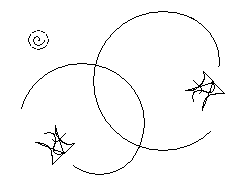(the time is front): later 後の
{
out/away from clothes/cover (外),
{
nature,
time} season (季節)}: summer 夏
: summer of the behind season (modifying from the left to the right): Indian summer 小春日和
notation for a pause (休止符)
: circle (円)
: (the grammatical notation for conjunction) and (接続符「と」)
{
preposition mark,
work); by
{
{
}('bird' by the total shape),
(violent)}: bird of prey; the symbol for 'hawk' is not ready yet, and the symbol for wider meaning is used. 猛禽;「鷹」を指す文字はまだなので、鷹も含むこれを使いました。和訳では日本で一般的なトビにしました。
: the grammatical notation to form a d-verb meaning that 'the subject' become(s) in the situation shown by the following character or phrase; or (the subject) do(does) the following action. d-動詞符
{
(piled),
(lines)}: crossed, situation crossed over each other 交差
intersect (交差する)
(in the pictograph){
(spreading energy),
(globe)} (by the total shape also): the sun (太陽)
The similar phrases/ideoms to 'Indian Summer' in other languages:
(*marked names are the mailers who informed about their phrase, linking their web sites. Thank you! *印は情報提供者です)
|
language |
phrase/ideom for   小春日和の類似語
小春日和の類似語 |
its direct meaning/back ground直接の意味 |
|
British |
St. Luke's summer/ St. Martin's summer |
perhaps because of the blessing and mercy feeling of the weather 恵み深い意味で、聖人の名の夏 |
|
French |
ete m de la Saint Martin
|
the same as St. Martin's summer 同上 |
|
Belgium French Flemish |
ete indian( with accents on 'ete') |
the same as Indian summer 米語から借用 na: after, zomer: summer 後の夏 |
|
German |
altweibersommer |
old-lady-summer 老婦人の夏 |
|
Italian |
estate di S. Martino/indiano
|
estate: summer 英語に同じ |
|
Spanish |
veranillo de San Martin
|
veranillo: late/untimely summer 時期はずれの遅い夏 |
|
Russian |
Babye Leto
( [ babje ljeta ] in IPA
) *Grigoriy ( another visual language, Langust ) |
Women (married peasant) Summer 働き女の夏 (because of comfortable rest for peasant women after gathering crops 収獲で多忙の後の静けさだから) |
| Swedish |
Brittsommar |
the summer of Birgitta (a female name)女聖人の夏:
usually around October 7th:
Birgitta's day |
|
Japanese |
ko-haru-biyori 小春日和 |
small-spring-weather (Japanese summer is usually very humid and uncomfortably hot, and indian summer in Japan is more like spring weather, and short. ) |
 Original Haiku (by Carolyn Hall ):
Original Haiku (by Carolyn Hall ): 

